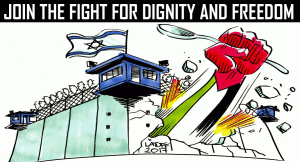
Image by Carlos Latuff and posted by Samidoun.
As the hunger strike of 1500 Palestinian prisoners for “Freedom and Dignity” enters its fourth week, the International Jewish anti-Zionist Network affirms its admiration for and solidarity with the hunger strikers
The moment is becoming critical in every sense. The Israeli colonial regime is reportedly preparing to import foreign doctors to force-feed prisoners, and prisoners are facing muscle wasting and fatigue. The prison authorities are repeatedly moving prisoners and placing others into solitary confinement in an effort to break their determination. In the face of Israel’s attempts to shatter their will, Fatah Movement General Commissioner for Prisoners’ Affairs in Gaza, Tayseer Al-Bardini, has stated, “their determination is steel.”
As the Palestinian writer Basil Farraj writes, “The body of the striking prisoner unsettles one of the most fundamental relationships to violence behind prison walls,” the colonial jailers’ control of prisoners’ bodies.
The prisoners recently released a collective statement against any attempt to force feed them, calling it “a project of the execution of the prisoners” and declaring, “We will deal with it on that basis and we will turn the prisons into sites of confrontation with our bare bodies, armed with our faith, our will, our determination and our confidence in our people, the Arab and Islamic nation and the forces of freedom and justice in the world to stand by our side.”
Anti-colonial and anti-racist forces around the world have rallied to the prisoners’ cause. Palestinian freedom fighter Leila Khaled has started a solidarity hunger strike, stating: “We will not allow the elimination of our peoples.” Solidarity actions have taken place across North Africa, including a collective symbolic fast of 1500 activists in Morocco. And students across the world have also begun solidarity hunger strikes, including at the University of Manchester. Activities have also taken place across France, which continues its colonial legacy not just through state racism but by holding the Arab political prisoner Georges Ibrahim Abdallah, who has also carried out a hunger strike alongside Moroccan, Tunisia, Algerian, and Basque detainees in France in solidarity with the Palestinian prisoners.
As young people in the Global North, among others who live or are imprisoned in the former and current colonial empires go without food in support of the colonized going without food in the Global South, the US regime media has offered a podium to the Israeli security official, Gilad Erdan, to slander the strikers. He writes in the New York Times, “Surrendering to such a strike would constitute a surrender to terrorism.”
We note that this is the same newspaper which gave space for the tarring of brilliant community organizer and victim of Israeli torture and sexual abuse, Rasmea Odeh, as a “terrorist,” disputing her place among the leadership of this year’s March 8 Women’s Strike, as well as the place of anti-Zionism amongst the demands of the feminist movement.
In lifting up the dignity strike, the movements which support the Palestinian cause have made it impossible for the racist Western media to entirely ignore the strikers. Khalida Jarrar, former Palestinian political prisoner, was interviewed and stated: “For me all the prisoners are political prisoners.” She pointed out the particular brutality inflicted through the denial of the right to see their families: “You can’t imagine how important family visits are. We are supposed to receive two visits a month, but some of the women I was with did not receive family visits at all.” Proper family visits are one of the fundamental demands of the strike, one of the many simple dignities the Israeli colonial regime denies to its thousands of political detainees.
IJAN adds our voices to the many voices of conscience across the world who offer their support to the prisoners’ efforts and to the anti-colonial struggle – of which hunger strikes are an inseparable part.


